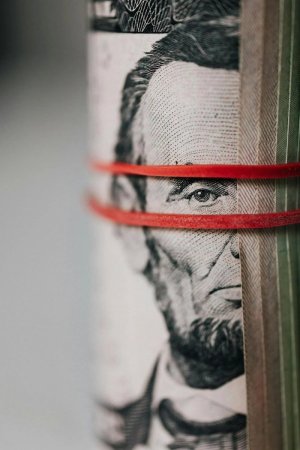Here’s what happens when you deposit a huge amount of cash—avoid this costly mistake!
By
Veronica E.
- Replies 0
Managing large amounts of money can feel overwhelming, especially when it comes to cash deposits.
Whether it’s a personal savings milestone or a windfall from a special occasion, depositing a significant sum of cash can raise concerns.
Understanding how banks and financial institutions handle large transactions can seem daunting, but knowledge is the key to avoiding unnecessary stress.
At The GrayVine, we’re here to help you navigate the ins and outs of banking rules, so you can handle your finances confidently and with peace of mind.
We’ll break down everything you need to know so you can make informed decisions and avoid common mistakes that could cost you. After all, your hard-earned money deserves to be managed wisely and securely.

Understanding the $10,000 Rule
When it comes to cash deposits, there's a rule you should know: The Bank Secrecy Act of 1970. This law requires banks to report cash deposits or withdrawals over $10,000 within a 24-hour period.
The goal? Preventing illegal activities like money laundering and tracking large sums of cash that could be used for such purposes.
Now, you might be thinking, "But I'm just a regular person, not involved in anything shady." And you're absolutely right!
But even if you're doing everything by the book, being aware of these regulations will help you avoid unnecessary attention.
The Cash Transaction Report (CTR)
When you deposit over $10,000, your bank is required to file a Cash Transaction Report (CTR) with the Financial Crimes Enforcement Network (FinCEN). This report includes your personal details, such as:

The Dangers of "Structuring"
Some people try to break up their large deposits into smaller amounts to sidestep the $10,000 rule. This is called "structuring," and it’s illegal.
If the bank suspects you're trying to outsmart the system, they'll report it to FinCEN. The consequences could be severe, including penalties, large fines, or even jail time. It's always best to follow the rules and avoid this risky behavior.
Depositing More Than $10,000 Legally
So, what if you truly need to deposit more than $10,000? Don't panic! First, check with your bank to see if they have specific policies for handling large deposits. You can also consider making smaller deposits or even opening an account at a bank that accommodates bigger transactions.
The key is communication—talk to your bank about your needs so there are no surprises.
Also read: You won’t believe what's really in your food—how rocks, bugs, and plastic sneak into your meals!
Balancing Your Checking Account
How much should you keep in your checking account? It's a good idea to maintain enough funds to cover at least a month or two of regular expenses. This provides flexibility for bills, unexpected costs, or emergencies, so you don't have to worry about dipping into savings or dealing with overdraft fees.
For example, if your monthly expenses are $1,500, having a balance that can comfortably cover that amount gives you peace of mind.
Of course, there are times when you might find it helpful to keep a larger balance, such as:
Depositing over $10,000 in cash doesn't have to be a stressful experience. By understanding the rules and planning ahead, you can avoid common mistakes and manage your finances with ease.
If you're ever in doubt, remember your bank is there to assist you—don't hesitate to ask them questions to ensure you're handling everything properly!
Related articles:
Bank of America Is Rejecting THIS Dollar Bill—Could Your Cash Be Denied?
Protect your bank account instantly with this crucial new setting for popular mobile phone users!
Urgent debit card alert: Six US banks expose major security breach

We’d love to hear your thoughts on this topic! Have you ever had to make a large cash deposit? How do you manage your checking account balance? Share your experiences and tips in the comments below. Let’s start a conversation!
Read next: Slash your food waste dramatically with this smart European grocery shopping trick!
Whether it’s a personal savings milestone or a windfall from a special occasion, depositing a significant sum of cash can raise concerns.
Understanding how banks and financial institutions handle large transactions can seem daunting, but knowledge is the key to avoiding unnecessary stress.
At The GrayVine, we’re here to help you navigate the ins and outs of banking rules, so you can handle your finances confidently and with peace of mind.
We’ll break down everything you need to know so you can make informed decisions and avoid common mistakes that could cost you. After all, your hard-earned money deserves to be managed wisely and securely.

Handling large sums of cash? Here's what you need to know before making a deposit. Image Source: Pexels / Photo By: Kaboompics.com.
Understanding the $10,000 Rule
When it comes to cash deposits, there's a rule you should know: The Bank Secrecy Act of 1970. This law requires banks to report cash deposits or withdrawals over $10,000 within a 24-hour period.
The goal? Preventing illegal activities like money laundering and tracking large sums of cash that could be used for such purposes.
Now, you might be thinking, "But I'm just a regular person, not involved in anything shady." And you're absolutely right!
But even if you're doing everything by the book, being aware of these regulations will help you avoid unnecessary attention.
The Cash Transaction Report (CTR)
When you deposit over $10,000, your bank is required to file a Cash Transaction Report (CTR) with the Financial Crimes Enforcement Network (FinCEN). This report includes your personal details, such as:
- Your name
- Address
- Social Security number
- Driver’s license number (if applicable)
- Date, amount, and type of transaction

Bank staff may ask questions when handling large cash deposits to ensure compliance with regulations. Image Source: Pexels / Kindel Media.
The Dangers of "Structuring"
Some people try to break up their large deposits into smaller amounts to sidestep the $10,000 rule. This is called "structuring," and it’s illegal.
If the bank suspects you're trying to outsmart the system, they'll report it to FinCEN. The consequences could be severe, including penalties, large fines, or even jail time. It's always best to follow the rules and avoid this risky behavior.
Depositing More Than $10,000 Legally
So, what if you truly need to deposit more than $10,000? Don't panic! First, check with your bank to see if they have specific policies for handling large deposits. You can also consider making smaller deposits or even opening an account at a bank that accommodates bigger transactions.
The key is communication—talk to your bank about your needs so there are no surprises.
Also read: You won’t believe what's really in your food—how rocks, bugs, and plastic sneak into your meals!
Balancing Your Checking Account
How much should you keep in your checking account? It's a good idea to maintain enough funds to cover at least a month or two of regular expenses. This provides flexibility for bills, unexpected costs, or emergencies, so you don't have to worry about dipping into savings or dealing with overdraft fees.
For example, if your monthly expenses are $1,500, having a balance that can comfortably cover that amount gives you peace of mind.
Of course, there are times when you might find it helpful to keep a larger balance, such as:
- Unpredictable income: If you have an irregular income or freelance work, having extra funds on hand can help you manage those periods with more ease.
- Variable expenses: If your expenses fluctuate from month to month, it's practical to have a little extra available to cover higher costs.
- Minimum balance requirements: Some banks may charge fees if your balance falls below a certain level, so maintaining a buffer can help avoid those fees.
- Holiday spending: Having extra funds set aside during festive seasons can make it easier to manage seasonal expenses without added stress.
Depositing over $10,000 in cash doesn't have to be a stressful experience. By understanding the rules and planning ahead, you can avoid common mistakes and manage your finances with ease.
If you're ever in doubt, remember your bank is there to assist you—don't hesitate to ask them questions to ensure you're handling everything properly!
Related articles:
Bank of America Is Rejecting THIS Dollar Bill—Could Your Cash Be Denied?
Protect your bank account instantly with this crucial new setting for popular mobile phone users!
Urgent debit card alert: Six US banks expose major security breach
Key Takeaways
- Banks must notify the government when a customer deposits or withdraws more than $10,000 in cash due to regulations aimed at preventing money laundering.
- Deliberately breaking up large sums into smaller deposits to evade reporting requirements, known as "structuring," is illegal and can result in severe penalties.
- Americans who need to deposit more than $10,000 should consult with their bank for available alternatives if their bank does not accept large deposits.
- Individuals should maintain enough money in their checking accounts to cover one to two months of expenses to manage their finances effectively and avoid potential overdrafts.
We’d love to hear your thoughts on this topic! Have you ever had to make a large cash deposit? How do you manage your checking account balance? Share your experiences and tips in the comments below. Let’s start a conversation!
Read next: Slash your food waste dramatically with this smart European grocery shopping trick!






